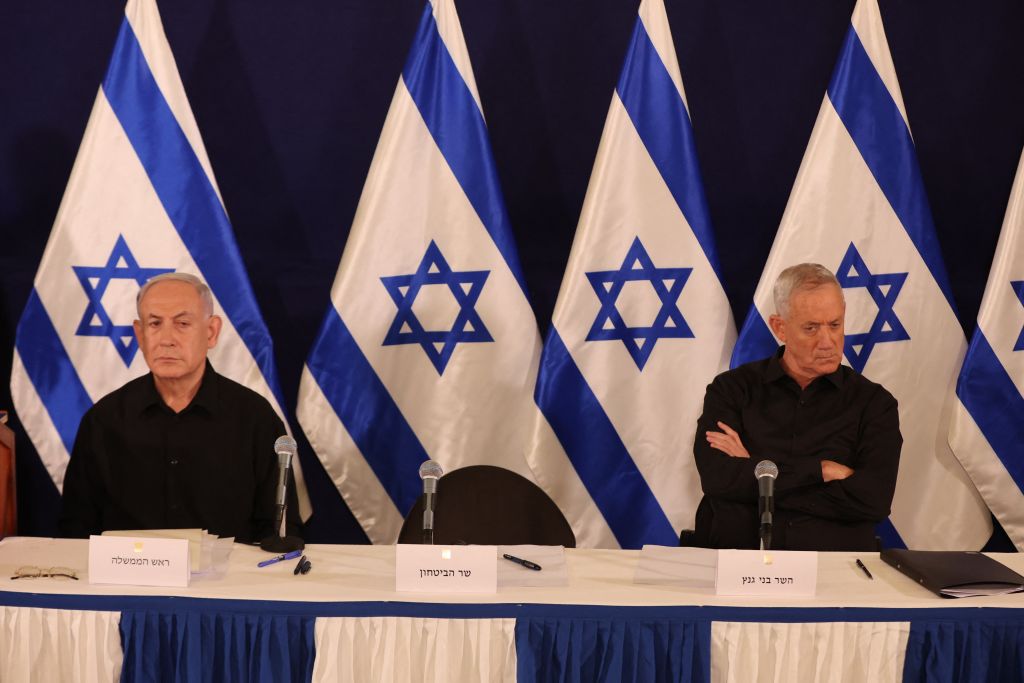The discourse in the West over the war in Gaza has devolved into a tiresome contest between unflinching support for Israel and equally uncompromising revulsion. But in Israel itself, Benjamin Netanyahu’s war cabinet appears on the verge of breaking down as a consequence of the embattled strongman’s muddled strategy.
As tens of thousands of Israelis, led by families of the hostages, protest for Netanyahu’s removal from power, retired general and member of Israel’s war cabinet triumvirate Benny Gantz announced in a speech yesterday evening that Netanyahu’s leadership “is taking Israel into a wall” and demanded a clear strategy for the war’s conclusion. Observing that “political and personal considerations are intruding into the holy of holies of security” and that “a small minority has taken over command”, Gantz gave Netanyahu a deadline of 8 June to formulate a coherent strategy for the Gaza War.
Gantz’s ultimatum builds on the renewed criticism from Defence Minister Yoav Gallant a few days earlier, highlighting the absence of any meaningful strategic vision for Gaza. As Gallant observed, Netanyahu’s refusal to countenance extending the rule of Fatah, the governing Palestinian party in the West Bank, to postwar Gaza “leads to a dangerous course, which promotes the idea of Israeli military and civilian governance in Gaza”. In Gallant’s own ultimatum, he demanded for Netanyahu “to make a decision and declare that Israel will not establish civilian control over the Gaza strip, that Israel will not establish military governance in the Gaza strip, and that a governing alternative to Hamas in the Gaza strip will be raised immediately”.
Two-thirds of Israel’s three-man war cabinet are now publicly against the third member, Netanyahu himself. But neither Gantz nor Gallant’s concerns derive from any special humanitarian impulses towards Gaza’s Palestinian population: as a Defence Ministry source leaked to the press, Israeli military occupation of Gaza would require the permanent stationing of five IDF divisions, weakening its capacity to respond to a conflict with Hezbollah in the north. This would also mean shouldering the costs of rebuilding Gaza’s ruins and governing a hostile population in a context of deepening international isolation.
Yet Gantz’s own proffered solution hardly seems more realistic: his plan for a “joint US-European-Arab-Palestinian administration in Gaza” requires both Western troops on the ground — an unappealing prospect for any Western leader — and a rapprochement with Arab states which have made clear that recognition of Palestine’s independence is a prerequisite for any involvement.
What’s more, his insistence that Israel return its northern border population, now living as refugees deeper inside the country, to their homes requires one of two things. It either means conceding to an increasingly assertive Hezbollah that the Gaza War has ended, with Hamas still in power, or a new confrontation with a vastly more powerful military force, all while the Gaza War remains unfinished.
Joe Biden’s indulgence of Netanyahu, driven by pressure from Western supporters who seem to believe they are helping Israel, has allowed the unpopular leader to hold onto power while drastically worsening his country’s strategic and diplomatic position. The growing dissent within the highest ranks of the Israeli government and IDF is a belated recognition that things cannot continue as they are. But, in preserving his throne, Netanyahu may have already checkmated his country.











Join the discussion
Join like minded readers that support our journalism by becoming a paid subscriber
To join the discussion in the comments, become a paid subscriber.
Join like minded readers that support our journalism, read unlimited articles and enjoy other subscriber-only benefits.
Subscribe